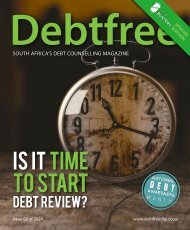Debtfree Issue 202302 DebtBusters Special Edition
- No tags were found...
You also want an ePaper? Increase the reach of your titles
YUMPU automatically turns print PDFs into web optimized ePapers that Google loves.
SPECIAL<br />
EDITION<br />
DEBT REVIEW<br />
AND YOUR<br />
CREDIT SCORE<br />
<strong>Issue</strong> 02 of 2023
EXCELLENCE IS DOING<br />
ORDINARY THINGS<br />
EXTRAORDINARILY<br />
WELL<br />
– John W. Gardner
WHAT MAKES US<br />
EXCELLENT?<br />
/ Unimpaired and automated PDA systems<br />
/ Integration with top-ranked Debt Counsellor systems<br />
/ Best customer support in the country – queries are resolved within 24 hours<br />
/ Strong compliance and best-industry-practice implementation is at our centre<br />
Call Saishen Krishnan<br />
Head of Hyphen PDA | 071 884 7300<br />
Or call our friendly support centre on 011 303 0060 - Option 2<br />
or visit our website www.hyphenpda.co.za
FROM THE EDITOR<br />
Tracking progress and keeping score is a very<br />
human characteristic. We do it all day long. We<br />
track our steps, our heart rates and our bank<br />
balance. Even our favourite sporting events have<br />
scoring.<br />
Some people can even watch fancy electric cars drive round and<br />
round and keep track of who is in the lead, and over the entire<br />
season who the winner will be.<br />
Of course, a positive (or increasing) score makes us happy (in<br />
most sports the one with the most points wins), a lower score<br />
not so much.<br />
This month, we delve into credit scores. This little set of numbers<br />
can drastically impact your ability to access credit at a good rate,<br />
and we discuss how entering debt review impacts on that score.<br />
It is both simple and complex, so check out the article if this is<br />
something that you worry about.<br />
We also look at recent NCT rulings about debt review and how<br />
consumers must come to the party, and work along with the<br />
process or they will make it impossible to succeed in debt review.
Part of working with the process involves the legal side of debt<br />
review. It can be a little challenging for some people, and by<br />
making mistakes when it comes to a Confirmatory Affidavit you<br />
could make or break your debt review.<br />
We mention top tips for getting this done in record time, with no<br />
hiccups. Here is a quick tip: don’t use regular mail via the post<br />
office to send it back to your Debt Counsellor, if you want the<br />
papers to reach them before your debt review is actually over (even<br />
with governments’ most recent R2.5 Billion bailout).<br />
Paying off your debt is really one of the ways you can reset your life<br />
and finally move towards success. Instead of owing people your<br />
time and money, you can use that time and energy to increase<br />
your own points on the board.<br />
If you are in debt review, then you don’t want to see big numbers<br />
when you look at your balances. This is one time in your life<br />
where you want to see smaller numbers. So, stick to your monthly<br />
budget, keep paying each month, track of your progress and pretty<br />
soon you could win by getting those balances down to zero and<br />
finally becoming debt free.
FROM THE<br />
DESK<br />
RESEARCH SHOWS<br />
DEBT COUNSELLING<br />
DELIVERS CREDIT-<br />
SCORE BENEFITS<br />
Evidence busts the myth<br />
that debt counselling has<br />
long-term negative impact<br />
on credit scores.<br />
Over-indebted consumers who<br />
successfully complete debt<br />
counselling have, on average,<br />
significantly higher credit scores<br />
than those who consider it but do<br />
not proceed.
This was the finding of a <strong>DebtBusters</strong>’ analysis of consumers who<br />
applied for debt counselling over the past five years.<br />
Benay Sager, head of <strong>DebtBusters</strong>, South Africa’s largest and leading<br />
debt management company, says the primary driver of a high credit<br />
score is the ability and willingness to pay back what is owed. This is<br />
true irrespective of whether the person is in debt counselling or not.<br />
“If you pay back your debt, your credit score will not be negatively<br />
affected over the long term. Debt counselling provides an effective<br />
means to pay back what you’ve borrowed in a structured and<br />
affordable way.”<br />
The data shows the impact on the credit score of over-indebted<br />
consumers who applied for debt counselling at <strong>DebtBusters</strong>. These<br />
consumers who stuck to the restructured payment programme on<br />
average completed their debt counselling journey in under five years.<br />
A consumer’s credit score will drop during the first few months of<br />
the debt counselling journey. In fact, for many consumers, the credit<br />
score is already in decline when they apply for debt counselling as<br />
they struggle to make ends meet.<br />
Sager explains the initial decline is to be expected as credit providers<br />
receive limited amount of debt repayments during this initial period as<br />
per wider industry agreements. He also mentions that credit providers<br />
know they will not receive payments in the first few months, and this<br />
is built into the overall programme.
FROM THE DEBT BUSTERS DESK<br />
Once negotiations with credit providers are finalised, and the<br />
consumer continues to pay the new restructured and more affordable<br />
repayments, a steady increase in their credit score can be seen.<br />
By month 12 of the debt counselling journey, the consumer’s<br />
credit score is on par with what it was when they applied for debt<br />
counselling. The increase gets even higher post clearance (i.e., when<br />
debt counselling is completed) - in fact on average consumers who<br />
complete debt counselling have an average credit score that is 112<br />
points higher than their starting point.<br />
“The data is unequivocal. It busts the myth that debt counselling<br />
negatively affects your credit score over the long term. Over-indebted<br />
consumers who enquire about, sign up and successfully complete<br />
debt counselling will not only have lower monthly debt repayments<br />
by having their debt restructured, but will emerge with significantly<br />
higher credit scores than their over-indebted peers who should have<br />
signed up but did not,” says Sager.<br />
He says your credit score is important because these three digits<br />
are what everyone from banks to landlords use to determine how<br />
financially dependable you are. For the financial industry, the credit<br />
score is just as important as an ID number, except credit scores can<br />
go up or down.<br />
A long-term goal of debt counselling is to help consumers improve<br />
their credit standing. “We see that on average, clients that have<br />
‘graduated’ from debt counselling, manage to secure vehicle finance<br />
within two months and secure a new home loan within five months
after completing debt counselling. This shows that for dedicated<br />
consumers, debt counselling can help turn around their long-term<br />
financial standing.”<br />
“The bottom line is that debt counselling is an effective way for<br />
over-indebted consumers to restructure their debt and the research<br />
shows that those who complete the process will also benefit from an<br />
improved credit score.”
DEBT REVIEW<br />
When you call your Debt Counsellor<br />
you may end up dealing with an<br />
administrative assistant. They may<br />
be able to help you with simple<br />
administrative functions.<br />
You should, however, keep this<br />
in mind when asking for advice.<br />
If you need to talk to the Debt<br />
Counsellor, ask to do so or make an<br />
appointment.
CONTENTS<br />
DEBT REVIEW AND<br />
YOUR CREDIT SCORE<br />
THE IMPORTANCE<br />
OF YOUR<br />
CONFIRMATORY<br />
AFFIDAVIT<br />
BUSINESS<br />
RESCUE TO<br />
THE RESCUE<br />
NEWS<br />
BEWARE ANNUAL<br />
INSURANCE<br />
INCREASES<br />
DISCLAIMER<br />
<strong>Debtfree</strong> Magazine considers its sources reliable and verifies as<br />
much information as possible. However, reporting inaccuracies<br />
can occur, consequently readers using this information do so<br />
at their own risk. <strong>Debtfree</strong> Magazine makes content available<br />
with the understanding that the publisher is not rendering legal<br />
services or financial advice. Although persons and companies<br />
mentioned herein are believed to be reputable, neither<br />
<strong>Debtfree</strong> Magazine nor any of its employees, sales executives<br />
or contributors accept any responsibility whatsoever for their<br />
activities. <strong>Debtfree</strong> Magazine contains material supplied to<br />
us by advertisers which does not necessarily reflect the views<br />
and opinions of the <strong>Debtfree</strong> Magazine team. No person,<br />
organization or party can copy or re-produce the content<br />
on this site and/or magazine or any part of this publication<br />
without a written consent from the editors’ panel and the<br />
author of the content, as applicable. <strong>Debtfree</strong> Magazine,<br />
authors and contributors reserve their rights with regards to<br />
copyright of their work.
DEBT REVIEW<br />
AND YOUR<br />
CREDIT SCORE
DEBT REVIEW AND YOUR CREDIT SCORE<br />
WHAT’S YOUR<br />
SCORE?<br />
How credit worthy are you?<br />
How much credit should you be<br />
given?<br />
What rate should you be given credit<br />
from a credit provider?<br />
Will you actually repay your debts?<br />
These are questions that credit providers want<br />
the answers to, and that credit bureaus share<br />
in credit reports about you. This info is also<br />
quickly reflected in what is commonly called<br />
your credit score.
DEBT REVIEW AND YOUR CREDIT SCORE<br />
CAN YOU BE<br />
TRUSTED?<br />
When you rock up at a credit provider and ask them<br />
to give you credit, it is hard for credit providers to<br />
take you at your word when they ask you about your<br />
current debt situation.<br />
This is because most people who ask for new credit, already owe<br />
money to other people.<br />
This is one reason credit bureaus came into existence, so they track<br />
how much debt you have, as well as how good you are at repaying<br />
your debt.<br />
Credit bureaus sell this information to credit providers who are<br />
thinking of giving you credit so that they can make more informed<br />
decisions about you.
DEBT REVIEW AND YOUR CREDIT SCORE<br />
WHAT IS A CREDIT<br />
REPORT?<br />
A credit report is a snapshot of your<br />
recent credit usage.<br />
A credit report is a document provided by<br />
a credit bureau with compiled information<br />
about you, everything from your recent<br />
employment and home address to who you<br />
owe money to and how regularly you make<br />
repayments.
DEBT REVIEW AND YOUR CREDIT SCORE<br />
WHAT IS A CREDIT<br />
SCORE?<br />
A credit score is essentially a<br />
numerical representation of your<br />
credit-worthiness, indicating your<br />
likelihood of repaying your debts on<br />
time.<br />
A credit score is normally a three digit number,<br />
calculated on your credit history, payment<br />
history, and credit utilization.<br />
For most people, it ranges between 300 and<br />
850 (in most countries) with a higher score<br />
basically saying to credit providers that you<br />
are better at repaying credit and handle debt<br />
well.<br />
In most cases the higher your credit score, the<br />
easier it is to obtain loans and other financial<br />
services, at a better interest rate.
DEBT REVIEW AND YOUR CREDIT SCORE<br />
GETTING CREDIT<br />
IN SA<br />
In South Africa, people have a right to apply for credit<br />
and not be discriminated against based on racial or<br />
social background.<br />
Credit providers who turn you down for credit, could be asked to<br />
explain in writing the reason they turned you down.<br />
The key factor on whether you can get credit or not is not your credit<br />
score or what is recorded in your credit report, but whether or not<br />
you can really afford the credit you are asking for.<br />
If you cannot realistically afford to repay the credit each month, then<br />
a credit provider is not allowed to give you credit, as they would be<br />
acting recklessly (which is illegal).<br />
To check if you can afford the credit you are asking for, a credit<br />
provider will ask for proof of what your household income is, and<br />
will also look at your other debt obligations. This is where your credit<br />
report and your credit score comes in.
DEBT REVIEW AND YOUR CREDIT SCORE<br />
WHO MAKES THESE CREDIT<br />
SCORES?<br />
Credit bureaus or credit reporting<br />
agencies make credit scores. They<br />
have common rules used by bureaus<br />
around the world, but tweaked for<br />
the local market.<br />
These bureaus collect and analyse data<br />
from various sources, including banks, credit<br />
providers, and retailers, to generate credit<br />
reports and scores.<br />
In South Africa, there are four main credit<br />
bureaus: TransUnion, Experian, Compuscan,<br />
and XDS.<br />
They are by no means the only ones and there<br />
are, so far, 54 bureaus registered with the NCR<br />
(in 2023) who might have information about<br />
you.
DEBT REVIEW AND YOUR CREDIT SCORE<br />
WHAT IS A GOOD CREDIT<br />
SCORE?<br />
In South Africa all four major credit bureaus (Experian,<br />
TransUnion, XDS, and Compuscan) use the same credit<br />
scoring system known as the FICO scoring model.<br />
The FICO scoring model is widely used by credit bureaus and lenders<br />
around the world, and is often seen as the global standard.<br />
FICO scores range between 300 and 850 and are calculated based on<br />
factors such as payment history, credit use, how long you have had<br />
access to the credit, credit mix, and recent credit applications.<br />
While each credit bureau may collect and report slightly different data<br />
about the same person, the big ones all use the same FICO scoring<br />
model to generate credit scores.<br />
A credit score of 750 or above is considered ‘excellent’ and can help<br />
you qualify for better loan terms and credit card rewards.<br />
Of course, these days with almost half of all credit users being in<br />
serious debt trouble and having missed payments, the majority of<br />
people usually have a much lower score.
DEBT REVIEW AND YOUR CREDIT SCORE<br />
HOW CAN YOU IMPROVE<br />
YOUR SCORE?<br />
Several things can improve your<br />
credit score, including paying your<br />
bills on time, reducing how much<br />
credit you use, and keeping your<br />
credit accounts open for a longer<br />
time.<br />
If you have a decent mix of different types of<br />
credit and pay them regularly, this can boost<br />
your score.<br />
If you are able to use your credit and repay the<br />
full amount each month, this is a good thing.<br />
Avoiding frequent credit applications can also<br />
boost your credit score (because you look less<br />
desperate).<br />
Debt Counsellor Roger Brown of Credit<br />
Matters says that “Consumers can dispute<br />
information that looks incorrect on their credit<br />
report with the credit bureaus…sorting out any<br />
mistakes there can help improve your score”.
DEBT REVIEW AND YOUR CREDIT SCORE<br />
WHAT MAKES YOUR SCORE<br />
WORSE?<br />
It might surprise you to learn that not having any credit<br />
accounts does not mean you will have a good score.<br />
In fact, because credit providers don’t know how you handle credit, it could<br />
result in a very low credit score. Credit scores can be 0 for those with no<br />
credit history or usage.<br />
It seems unfair but that’s how it works.<br />
Several other factors can negatively affect your credit score. The biggest<br />
being missing debt repayments. Credit providers don’t like that, and if you<br />
have been missing payments this will really knock your score down.<br />
Paying less than the agreed monthly debt repayment amount, or even<br />
paying the full required amount a few days later than you said you would,<br />
can drop your score.<br />
Having fully maxed out accounts (or using most of your available credit) is<br />
also something that negatively effects your score. Ironically, closing credit<br />
accounts is also something that can lower your credit score.<br />
Keep in mind that when you run around asking lots of different people for<br />
credit within a short time, it can also make your credit score drop.
DEBT REVIEW AND YOUR CREDIT SCORE<br />
DEBT REVIEW AND YOUR<br />
CREDIT SCORE<br />
If you have needed to start the debt review process,<br />
then your credit score was probably not looking good,<br />
because you were probably in debt distress. This would<br />
have been reflected in your credit score and report.<br />
Maybe you had lots of missed payments or late payments or partial<br />
payments. You might have maxed out some of your credit accounts<br />
and credit providers might have been turning down your new<br />
applications for more credit.<br />
With that as your starting point, debt review doesn’t hurt your credit<br />
score or credit worthiness (since no one wants to give you credit<br />
anyway) in any significant way.
DEBT REVIEW AND YOUR CREDIT SCORE<br />
BUT WHAT DOES<br />
HAPPEN?<br />
When you apply for debt review and debt restructuring, the<br />
Debt Counsellor lets the NCR know you have started the<br />
process and they, in turn, notify the credit bureaus (via a<br />
computer system).<br />
During the time you are in debt review, credit bureaus will put a small<br />
indicator in place (often called a flag) to tell credit providers that you are<br />
getting rid of your debt, not taking on more debt.<br />
Credit providers will not be quick to offer you credit, as this could be seen as<br />
‘reckless’, which is illegal, and can land them in hot water with the National<br />
Credit Regular (NCR) and even facing fines of R1 million and hurt the value<br />
of their shares.<br />
So, in many ways, your credit score doesn’t matter while you are in debt<br />
review. It will, however, be something that you may want to improve after<br />
you finish debt review, if you are thinking of using credit again in the future.<br />
Debt Counsellor Roger Brown, points to this reality when he says: “it doesn’t<br />
matter…until it does”.
DEBT REVIEW AND YOUR CREDIT SCORE<br />
BUILDING YOUR CREDIT SCORE<br />
AFTER DEBT REVIEW<br />
Brown says that these days the credit bureaus are<br />
better than ever in featuring correct information,<br />
“things really improved with the introduction of the<br />
National Credit Act”.<br />
He explains that: “When a consumer successfully ends debt review,<br />
we notify the NCR, who in turn notify the credit bureaus and the debt<br />
review flag is then totally removed from the consumer’s credit report”.<br />
It is always a good idea to draw a credit report a short while after your<br />
debt review ends to see what it shows. If you see any record of the<br />
debt review, then your Debt Counsellor can help by following up with<br />
the NCR and credit bureau, or you can lodge a complaint and force<br />
the credit bureau to update their records.<br />
NOTE: If you drop out of debt review before it is finished,<br />
then the flag remains in place until you pay off all your debts.<br />
The record of your failed debt review may prevent you from<br />
getting new credit until you sort out all your existing debt.<br />
At the end of your debt review, you will probably have closed many of<br />
your former accounts, and have no more debts so your credit score<br />
may look a bit weak. You may want to start to rebuild your credit score.
DEBT REVIEW AND YOUR CREDIT SCORE<br />
YOUR SCORE AND THE<br />
RATE YOU GET<br />
As mentioned before, if you can<br />
afford to pay for credit, then<br />
you should be able to get credit,<br />
regardless of what your credit<br />
history looks like.<br />
If you were in debt review but paid up all your<br />
debts then you will be able to get credit again.<br />
Your credit score, however, will very much<br />
influence what kind of rate you get on the<br />
new credit you apply for.<br />
A low score will probably mean a higher rate.<br />
And the interest portion of credit is always the<br />
part that hurts and really costs you money<br />
over time.<br />
So, having a better score can be beneficial if<br />
you do want to make use of credit.
DEBT REVIEW AND YOUR CREDIT SCORE<br />
GETTING BACK<br />
IN THE GAME<br />
If you intend to make use of credit to buy something,<br />
perhaps something big like a house or a car, then it can<br />
be beneficial to build up your score in order to get a<br />
better interest rate.<br />
In such cases, it may be beneficial to pre-emptively start rebuilding a<br />
credit history. You could do this by taking out a small loan or applying<br />
for a credit card and making regular payments on time each month to<br />
establish a positive credit history, which will increase your credit score<br />
over time.<br />
When using credit, it is always good to “behave” yourself and be<br />
responsible. As a bonus you can use some of the lessons you learned<br />
during your debt review.<br />
When you do get back into the credit usage game, focus on paying<br />
your monthly instalments on time. Avoid maxing out your available<br />
credit. Keep a little mix of different types of accounts and be sure to<br />
pay the full amount that you agreed to. This will help keep your credit<br />
score high.
DEBT REVIEW<br />
Beware of calls from credit provider<br />
collections agents who say things<br />
like: your payment has not been<br />
received”. They may not even work<br />
directly for your bank.<br />
They may also create the impression<br />
that the debt review process is not<br />
working. Be sure to get all the fact<br />
from your Debt Counsellor, attorney<br />
and your Payment Distribution Agent<br />
before assuming the worst.
No more debt-stress.<br />
Let’s get it sorted.<br />
We’ll get your interest rates right down. You’ll<br />
make one consolidated payment a month. You’ll<br />
have more cash to live on. Your assets will be<br />
legally protected. Sorted.<br />
0861 365 910<br />
www.debtbusters.co.za<br />
info@debtbusters.co.za<br />
NCRDC2484
THE<br />
IMPORTANCE<br />
OF YOUR<br />
CONFIRMATORY<br />
AFFIDAVIT
CONFIRMATORY AFFIDAVIT<br />
IT’S ALL IN THE<br />
PAPERWORK<br />
If you have just entered debt review,<br />
you will be asked to supply your<br />
Debt Counsellor and your attorney<br />
with many different documents, and<br />
to sign lots of forms.<br />
It can seem boring and time consuming, but it<br />
really helps ensure that your Debt Counsellor<br />
and attorney have all the right information and<br />
that you understand what you are committing<br />
yourself to.<br />
Also, because debt review is a legal process<br />
which goes to court or tribunal, you will be<br />
asked to sign, what is called, a confirmatory<br />
affidavit and then return it to your Debt<br />
Counsellor and attorney as soon as possible.<br />
So, just what is a confirmatory affidavit, why<br />
do you need one, and how can you mess up<br />
your entire debt review if you don’t send this<br />
document back in time?
CONFIRMATORY AFFIDAVIT<br />
DEBT REVIEW IS A<br />
LEGAL PROCESS<br />
The debt review process involves creating debt<br />
restructuring proposals that are initially sent to your<br />
credit providers (who can agree or refuse).<br />
Their replies are compiled, and set out in legal documents that are<br />
taken to a court or the National Consumer Tribunal (NCT).<br />
It is ultimately a court that decides whether or not you qualify for debt<br />
review (are legally over indebted) and what the debt restructuring<br />
arrangement will be. They do this by referring to all those documents<br />
you completed and signed, which were submitted by your attorney.<br />
Other important documents will also be submitted to the court,<br />
like your Debt Counsellor’s certificate (from the NCR) and your<br />
application form, where you initially asked for help. There will also be<br />
information about your debts and how the Debt Counsellor thinks the<br />
debts can best be settled.<br />
One of the most important documents that will be included in your<br />
court papers is called a confirmatory affidavit.
CONFIRMATORY AFFIDAVIT<br />
WHAT IS A CONFIRMATORY<br />
AFFIDAVIT?<br />
A confirmatory affidavit is a legal<br />
document that confirms the<br />
authenticity of a statement or fact<br />
made by an individual.<br />
In this case, the confirmatory affidavit<br />
confirms that you:<br />
1. Did ask the Debt Counsellor for help, and<br />
2. Agree with the debt restructuring<br />
proposal that has been created for you,<br />
and<br />
3. Agree with the things the Debt<br />
Counsellor has said about your matter<br />
and the plan.<br />
This document will form part of the court<br />
documents that are submitted on your behalf.
CONFIRMATORY AFFIDAVIT<br />
HAVING THIS DOCUMENT<br />
COMMISSIONED<br />
Unlike a lot of documents that you<br />
receive at the start of debt review,<br />
this is not a document that you can<br />
just sign and send back to the Debt<br />
Counsellor or attorney. No, you<br />
need to take an extra step.<br />
To make the confirmatory affidavit<br />
legally binding, you must sign it before a<br />
commissioner of oaths.<br />
A commissioner of oaths is a person who is<br />
authorized to verify and witness the signing<br />
of legal documents. In South Africa, members<br />
of the South African Police Service (SAPS) are<br />
authorized to act as commissioners of oaths.<br />
One of the most popular ways to have a<br />
document commissioned is by heading down<br />
to your local police station and asking for a<br />
officer (a commissioner of oaths) to help.<br />
This takes time and effort.
CONFIRMATORY AFFIDAVIT<br />
TOO MUCH LIKE<br />
HARD WORK?<br />
Many consumers make the mistake<br />
of taking too long to do this,<br />
because they do not want to go to<br />
all the trouble of going to the police<br />
station and potentially waiting in a<br />
queue.<br />
Many find it hard to get to the station during<br />
suitable hours since they are busy working.<br />
But finding excuses not to get the document<br />
commissioned does not help. Instead it can<br />
really harm your case, and throw all the<br />
protection of debt review out the window.
CONFIRMATORY AFFIDAVIT<br />
MAKING IT IMPOSSIBLE FOR<br />
YOUR ATTORNEYS IS<br />
BAD FOR YOU<br />
Quintin Zimmerman of Liddles Attorneys says that<br />
“as a debt review attorney, the greatest frustration<br />
we experience in expeditiously issuing debt review<br />
court applications is the delay in obtaining the original<br />
confirmatory affidavits from consumers”.<br />
In terms of the NCA regulations and the rules of court, the courts<br />
require that the consumer’s original confirmatory affidavit must be<br />
included as part of the issued court application.<br />
The National Credit Act sets out a time period when people first start<br />
debt review in which credit providers have to behave themselves, but<br />
if that time period passes, then some nasty credit providers can try to<br />
get out of the process.<br />
While most credit providers like to cooperate with the debt review<br />
process, they also want to get things sorted out as soon as possible,<br />
and don’t want things to drag on and on unresolved.<br />
Quintin says that: “from date of signing the Form 16, we (the debt<br />
counsellors and attorneys) only have 60 days to get the matter to
court to prevent credit providers from being able to terminate the<br />
debt review process”.<br />
While debt reviews does not have to be put before a court within<br />
this time period (it can be impossible for a variety or reasons) it is<br />
considered by most attorneys as ‘best practice’ to do so.<br />
This is because once the matter is set down in court, then credit<br />
providers will not want to start a second lot of legal action (and waste<br />
another courts time).<br />
This means that set down matters help protect consumer’s assets,<br />
and ensure better cooperation from credit providers (or recourse for<br />
consumers if a naughty credit provider tries to cause problems).<br />
Quintin has this advice for consumers: “when you receive the<br />
confirmatory affidavit from the attorneys, be responsible and please<br />
go as soon as possible to a commissioner of oaths to sign the<br />
affidavit. A timeously issued debt review court application is for your<br />
legal protection and peace of mind”.
CONFIRMATORY AFFIDAVIT<br />
MAKE SURE YOU KNOW<br />
WHAT YOU ARE<br />
AGREEING TO<br />
It is important to make sure that you<br />
understand the debt restructuring<br />
proposal before you sign the<br />
confirmatory affidavit.<br />
Read it (even though it is in some fancy<br />
sounding court language) and see what it says.<br />
Moreover, your Debt Counsellor should<br />
explain the planned debt restructuring<br />
proposal to you in detail, and you should feel<br />
comfortable with the terms before signing the<br />
document.<br />
After all, this is what you are saying in the<br />
affidavit. You agree with the plan and will stick<br />
to it.
CONFIRMATORY AFFIDAVIT<br />
MAKE SURE YOU<br />
DO IT RIGHT<br />
Once you have headed to the offices of a<br />
commissioner of oaths (eg. an attorney or at the local<br />
SAPS station) you need to make sure that you do<br />
things right, or it can become a problem in a court<br />
with a difficult Magistrate.<br />
Attorney Rynhardt De Lange of MiLaw says: “when you have your<br />
confirmatory affidavit commissioned, it is important that you make<br />
sure each page is initialled and sign the last page in the presence of<br />
the commissioner of oaths. The commissioner will then stamp the<br />
document to confirm that it has been legally verified. Make sure their<br />
full details are recorded on the affidavit”.<br />
Here are more tips he offers:<br />
• TIP: Don’t print the confirmatory document on back to back<br />
sides of the same page. The courts don’t like that. Rather, print<br />
each page of the document on its own piece of paper. You<br />
can save the forests later.<br />
• TIP: Sign in black pen. The courts like that. This is not the time<br />
to get artistic.
CONFIRMATORY AFFIDAVIT<br />
PLEASE SEND IT BACK<br />
ASAP<br />
Since the document has to be<br />
included in the court documents<br />
(which help keep your assets safe) it<br />
is crucial that once commissioned,<br />
you return the affidavit back to your<br />
Debt Counsellor or attorneys as<br />
quickly as possible.<br />
The sooner you do it, the better. This will give<br />
your Debt Counsellor and attorney more time<br />
to submit the court papers and ensure that<br />
the debt review process runs as smoothly as<br />
possible.
BEWARE<br />
ANNUAL<br />
INSURANCE<br />
INCREASES
ANNUAL INSURANCE INCREASES<br />
THE DANGER OF<br />
INCREASES<br />
End balance differences have long<br />
haunted the debt review industry.<br />
Consumers and Debt Counsellors expect an<br />
account to be paid up but the credit provider<br />
shows an amount owing.<br />
PDA calculations show the account should be<br />
paid up but the credit provider insists on more<br />
money.<br />
While this can happen due to payments dates<br />
and slight interest calculation differences<br />
there can be a hidden reason affecting some<br />
accounts.<br />
Unnoticed annual insurance increases!
ANNUAL INSURANCE INCREASES<br />
SNEAKY<br />
INCREASES<br />
It is not uncommon for an account<br />
to have insurance built in. This may<br />
be CLI or it may be on a bond. It is<br />
also common for prices to slowly go<br />
up or hopefully down over time.<br />
Normally, when there will be a change to an<br />
insurance premium, the provider should let<br />
the client know. The client, in turn, should<br />
let their Debt Counsellor know if they get<br />
notification about such a change. Sometimes,<br />
however, these increases can slip in unnoticed<br />
by everyone.<br />
This could be because of a failure to<br />
communicate by the insurer or by the<br />
consumer. Either way, the increase can throw<br />
off the Debt Counsellor’s projected repayment<br />
plan which is set out over several years. It can<br />
have very negative consequences and cause<br />
problems if this occurs.
ANNUAL INSURANCE INCREASES<br />
For example, let’s say the Debt Counsellor arranges for an<br />
account to receive R1000 debt repayment each month, with<br />
the insurance portion being R100*<br />
In this case R900 goes toward the debt (and interest portion)<br />
and R100 goes to insurance.<br />
Then, if the insurance portion later goes up by… let’s say R50<br />
the next year, it begins to mess with the plan.<br />
What happens is the money that should be going towards reducing<br />
the original debt is less than expected and more funds are allocated<br />
to the increased insurance. Progressively, month by month, the gap<br />
between what you expect to happen (the original plan) and what is<br />
actually happening gets wider and wider.<br />
And every time the bank adds a new increase or adds extra interest,<br />
that would not have been there before, the plan and reality get further<br />
and further apart.<br />
Because this can happen on big debts, like bonds, the insurance<br />
figures for some accounts can be quite large. Thus, increases in<br />
the insurance amount, if unnoticed and not adjusted for (with<br />
increased payments by the client), can result in really big end balance<br />
differences.<br />
* We have really fudged these figures for simplicity’s sake. You get the idea though.
ANNUAL INSURANCE INCREASES<br />
WHAT TO DO<br />
ABOUT IT<br />
Now, you may want to argue with the credit provider or<br />
the insurance people about who should have notified<br />
whom and when, but it may not change the end result.<br />
The projected payments won’t be the same as what has<br />
actually happened. This can leave consumers in debt<br />
review angry and disappointed with everyone.<br />
It might even tip a payment that was reducing the balance over time<br />
into allowing the balance to slowly begin to increase (which is bad).<br />
What many Debt Counsellors prefer to do is work with a FAIS<br />
compliant service provider who advises the clients about their<br />
insurance and maybe even change the insurance supplier to a more<br />
affordable or suitable one, with better benefits for people in debt<br />
review. These payments can then be properly allocated in the debt<br />
repayment plan and PDA payments.<br />
Whatever your policy is, this is something to keep an eye on or sneaky<br />
annual increases can cause a lot of trouble.
BREAKING<br />
NEWS<br />
UNIVERSITY GRADUATES<br />
WITHOUT WORK<br />
At the start of 2023, more than 716,000 South African<br />
university graduates applied for the R350 Social Relief of<br />
Distress Grant.<br />
The grant was initially introduced in 2020 to support those<br />
who lost their jobs or income due to the Covid 19 pandemic<br />
and lockdown.<br />
This very high number of applications from graduates is<br />
indicative of the challenges faced by young people in finding<br />
employment at the moment. It is estimated that the current<br />
‘youth unemployment rate’ is more than 46%.
FUNDING TERRORISTS<br />
& ALLOWING MONEY<br />
LAUNDERING<br />
In February 2023, both South Africa and Nigeria were added<br />
to the ‘grey list’ of the Financial Action Task Force, due to<br />
shortcomings in their efforts to combat money laundering<br />
and terrorist financing.<br />
This designation means that banks and financial institutions<br />
in these countries will undergo additional scrutiny and<br />
compliance measures, potentially leading to higher fees for<br />
consumers down the line.<br />
Both countries will need to address the identified deficiencies<br />
and demonstrate progress in improving their anti-money<br />
laundering and counter-terrorism financing frameworks in<br />
order to get off the list.<br />
SA has already managed to action 15 out of 20 identified<br />
areas, but these efforts were not enough to avoid the grey<br />
listing as expected.
BUDGET SPEECH<br />
HIGHLIGHTS<br />
On February 23, 2023, South African Finance Minister Enoch<br />
Godongwana delivered the country’s budget speech, which<br />
focused on taxes and energy crisis.<br />
It seems that once again SARS did a good job, and more<br />
money than was initially expected came in, which will now<br />
immediately be spent servicing debt and on new projects<br />
(like hiring thousands of the very necessary cops).<br />
Godongwana acknowledged the impact of load-shedding<br />
on South African businesses and consumers and proposed<br />
measures to address the issue. These measures include<br />
incentivizing businesses to invest in renewable energy,<br />
offering home owners tax rebates and introducing penalties<br />
for companies that fail to meet energy efficiency targets.<br />
Government will take on about half of Eskom’s massive debt<br />
in an effort to free up funds for them to use to actually fix<br />
and maintain equipment (instead of just paying off loans).<br />
In some very welcome news, it was announced that<br />
government would not raise income tax rates for individuals<br />
or businesses this year, and will shift the tax bands to match<br />
inflation.
There will be the usual small increase excise duties on<br />
tobacco and alcohol products, and on sugary drinks, which<br />
is almost a given these days. Almost as obligatory was the<br />
announcement of billions of Rands worth of bail-out money<br />
for SAA and the Post Office. Apparently, SAA is very close to<br />
breaking even these days.<br />
Other good news included the continuation of the R350<br />
grant which millions of South Africans are receiving monthly,<br />
since the start of the Covid-19 pandemic. The grant will be<br />
around until March next year.<br />
The Finance Minister also announced several other initiatives<br />
to promote economic growth and create jobs, including<br />
increased funding for small and medium-sized businesses,<br />
investments in infrastructure, and the expansion of the<br />
country’s digital economy.<br />
It was seen as a fairly conservative budget that successfully<br />
upset almost everyone in some way or another, and dealt<br />
with most of the elephants in the room.
LEGAL<br />
MATTERS<br />
In a recent matter that was before the National<br />
Consumer Tribunal which resulted from complaints by<br />
a consumer the NCT was asked, by the NCR, to rule on<br />
whether the Debt Counsellor had failed in their job.<br />
There were a number of interesting points in the ruling* but one<br />
thought that came out quite strongly was that consumers need to<br />
cooperate with the debt review process.<br />
Imagine someone suing their personal trainer for failing to make them<br />
fit but the client refused to do any exercise.<br />
Paragraph 62 and 63 were particularly interesting. They state, in part<br />
(we added some bold to some text):<br />
62. The responsibility of consumers is particularly important<br />
when a credit provider does not accept a proposal from<br />
the debt counsellor following consultations with the<br />
consumer. In such an instance, the consumer must<br />
participate in good faith in further negotiations with the<br />
credit provider and comply with any reasonable request<br />
by the debt counsellor to facilitate a responsible debt re-
arrangement plan with a credit provider. The Tribunal finds<br />
that a request to contact the debt counsellor to discuss<br />
alternative settlement proposals is reasonable. According<br />
to the evidence before the Tribunal, the Respondent made<br />
numerous attempts to contact the consumers as sampled,<br />
to further engage in alternative settlement proposals where<br />
credit providers did not accept the initial proposal. By<br />
failing to respond and accordingly participate in good<br />
faith in further settlement negotiations, consumers<br />
contravene the Act.<br />
63. The consumer’s responsibility to act in good faith<br />
during the debt review process is similarly essential<br />
in the proper execution of sections 86(7)(b) and 86(8)<br />
(b). The Tribunal reiterates that these sections apply to<br />
an assessment outcome that the consumer is not overindebted<br />
but nevertheless experiencing difficulty satisfying<br />
all his or her obligations under credit agreements in a timely<br />
manner. Where a debt counsellor makes a recommendation<br />
in such an instance, and this recommendation is not<br />
accepted by all the credit providers, the debt counsellor<br />
must [Emphasis added] refer the recommendation to the<br />
Magistrate’s Court.<br />
The ruling reminds consumers that they must communicate and<br />
cooperate with their Debt Counsellor and must be open to making<br />
changes to their lifestyle in order to pay off their debts.<br />
* Over the next few weeks we will be mentioning other highlights from this<br />
case ( NCR vs Munsamy) so be sure to visit www.debtfreedigi.co.za for more<br />
information.
BUSINESS<br />
RESCUE<br />
TO THE<br />
RESCUE
BUSINESS RESCUE TO THE RESCUE<br />
BUSINESS<br />
RESCUE<br />
Every Debt Counsellor, at some time<br />
or another, has received a request<br />
from a consumer asking for help<br />
with their financial difficulties only to<br />
realise that the debt they are talking<br />
about is not of a personal nature but<br />
rather relates to their business.<br />
Most of the time, we then have to inform the<br />
consumer that we can’t help them. After all,<br />
as Debt Counsellors, we specialise in helping<br />
consumers with their personal debt.<br />
But what if there was a way you could assist<br />
them?
BUSINESS RESCUE TO THE RESCUE<br />
WHAT IF YOU<br />
COULD HELP?<br />
No doubt you have heard about<br />
and perhaps even researched a little<br />
about business rescue. In many<br />
ways it is like debt review but for a<br />
company rather than an individual.<br />
The essence of business rescue is to facilitate<br />
the rehabilitation of a company that is<br />
“financially distressed” by providing for:<br />
the temporary supervision of the company<br />
and management of its affairs, business and<br />
property by a Business Rescue Practitioner;<br />
providing a temporary moratorium against<br />
legal action, even enforcement action by<br />
creditors against the company;<br />
developing and implementing (if approved by<br />
creditors) a business rescue plan to restructure<br />
a business’s affairs, property, debt liabilities<br />
and equity<br />
All that would be done with the goal of<br />
achieving a better return for the company’s
creditors higher than what they would have<br />
received if the company was simply liquidated.<br />
“Business Rescue is Debt Counselling on<br />
steroids” says Raynard McLaren, a Business<br />
Rescue Professional from REM Corporate<br />
Solutions. According to Raynard, who has<br />
been involved in Business Rescue since back<br />
in 2014, not all businesses would be able to<br />
be rescued as there must be a reasonable<br />
prospect for rescue and that would only be<br />
able to be determined once a Business Health<br />
Check has been done.<br />
This is much like how Debt Counsellors do<br />
a debt review or evaluation for consumers<br />
but with all the businesses info and debts.<br />
With some hard work and good planning, it is<br />
possible to make a suitable and realistic plan<br />
to vastly improve many businesses viability.<br />
Raynard also says that the Companies Act<br />
strictly stipulates the timeframe in which the<br />
business rescue process must take place<br />
which includes the formulation of a business<br />
rescue plan on which the creditors of the<br />
company must either vote to implement,<br />
amend or reject. So, time is a factor.
BUSINESS RESCUE TO THE RESCUE<br />
COULD YOU ADD THIS TO<br />
YOUR SERVICE<br />
If you are looking to expand your<br />
offerings or would like to help<br />
consumers with these types of<br />
challenges, then you might want to<br />
consider partnering with a reliable<br />
business rescue professional.<br />
It could be one of your extended external<br />
service offerings to consumers, on a business<br />
level to deal with their debts.<br />
That way these consumers can get the help<br />
their business needs and on a personal level<br />
can also make use of your debt counselling<br />
services too.<br />
As a bonus, it can even help generate an<br />
additional revenue stream for your practice,<br />
which never hurts.<br />
For more info about how business rescue works head over to<br />
Google or check out www.remcorp.co.za
DEBT REVIEW<br />
If you drop out of debt review you<br />
will have to go back to paying your<br />
original instalments or more (to<br />
catch up).<br />
Obviously, this is going to be<br />
incredibly hard to do. You may also<br />
find that credit providers even start<br />
new legal action against you if you<br />
cannot catch up fast enough. So,<br />
rather stick with the process and<br />
never miss a payment.
















